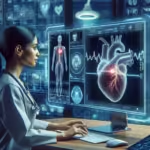Revolutionizing Heart Care with AI Image-Recognition
In the rapidly evolving landscape of healthcare technology, artificial intelligence (AI) continues to redefine how medical professionals diagnose and treat patients. One of the most exciting advancements is the implementation of AI in image-recognition, particularly in cardiology. A recent study illuminates how AI can enhance speed and accuracy in heart care, making it a game-changer for both patients and healthcare providers.
The Role of AI in Cardiology
AI’s capabilities in data processing and analysis are already well-documented across various sectors. In cardiology, AI image-recognition programs are now able to analyze heart images more efficiently than traditional methods. Here’s how AI is transforming the field:
- Enhanced Diagnostic Accuracy: AI algorithms can swiftly identify abnormalities in heart images, which can lead to earlier and more accurate diagnoses.
- Time Efficiency: AI-driven image recognition reduces the time needed for image analysis, allowing for quicker decision-making and potentially life-saving interventions.
- Reduced Human Error: By automating image analysis, AI minimizes the risk of oversight that can occur with manual evaluations.
Accelerating Heart Image Analysis
The advent of AI in cardiology is not only about improving accuracy but also significantly speeding up the process. Traditional methods of analyzing heart images can be time-consuming, involving several steps of manual evaluation.
With AI, the process is streamlined through machine learning algorithms that can process large amounts of data in a fraction of the time. These algorithms have been trained on extensive datasets to recognize and classify various heart conditions with impressive precision. As a result, the turnaround time for analysis is significantly shortened, offering a substantial advantage in urgent care situations.
Impacts on Patient Care
The integration of AI image-recognition in heart care offers numerous benefits for patients, which include:
- Quicker Diagnosis: A faster diagnosis process means patients can receive treatment sooner, improving outcomes especially in emergency scenarios like heart attacks.
- Targeted Treatments: AI’s detailed analysis supports personalized treatment plans tailored to the specific needs of each patient.
- Improved Monitoring: Frequent and accurate assessments can be made for patients with chronic heart conditions, reducing hospital visits and enabling better management of their health.
AI’s Contribution to Preventive Cardiology
Preventive cardiology focuses on reducing the risk of heart conditions before they develop or worsen. AI aids this by identifying risk factors and early signs of disease that might be imperceptible to the human eye.
For instance, an AI system can analyze historical data and current images to predict the likelihood of future heart issues, thus facilitating early interventions. This proactive approach can improve patient outcomes and potentially reduce the incidence of heart disease.
The Future of AI in Healthcare
As AI systems become more sophisticated, their applications in healthcare will continue to expand. The potential for AI to work alongside healthcare professionals is immense, offering support in areas such as:
- Radiology: Beyond cardiology, AI can assist in the analysis of imaging from various modalities, including X-rays, CT scans, and MRIs.
- Pathology: AI can enhance the accuracy of pathological assessments, ensuring more precise diagnoses and treatment plans.
- Telemedicine: In remote care settings, AI tools can provide crucial diagnostic support where human expertise may not be readily available.
Integrating AI in Clinical Practice
Despite its benefits, integrating AI into clinical practice is not without challenges. It requires:
- Data Security: Ensuring patient data is protected against breaches is paramount.
- Regulatory Compliance: AI systems must meet rigorous standards and healthcare regulations to be approved for clinical use.
- Interdisciplinary Collaboration: Successful integration demands teamwork between technologists, clinicians, and policymakers.
Moreover, training healthcare professionals to effectively use AI tools is critical. By incorporating AI into medical education, future practitioners can become adept at leveraging technology, ensuring seamless integration into clinical workflows.
Conclusion
The use of AI in heart care signifies a pivotal advancement in modern medicine, offering enhanced speed and accuracy that can drastically improve patient outcomes. While there are still hurdles to overcome, the potential benefits AI brings to cardiology and wider healthcare are substantial. As AI continues to evolve, it is poised to become an indispensable tool in our mission to deliver more effective and efficient healthcare services. Embracing these innovations will not only enhance patient care but also pave the way for future breakthroughs in the medical field.








